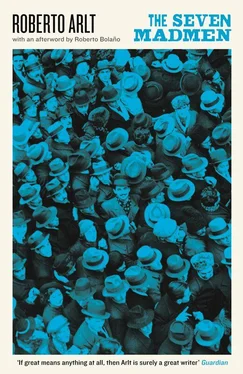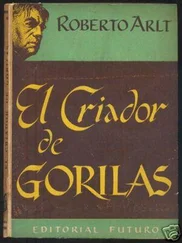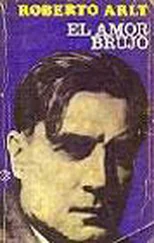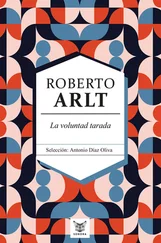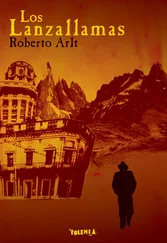“I won 5,000 pesos both times …”
“That may be so. But what saves you is not the secret of roulette but the fact that you have a noble soul. You’re capable of doing good, of taking pity on a man who’s at the gates of prison …”
“You’re right there,” Ergueta cut in. “In our town there’s another pharmacist, an old skinflint. His son stole 5,000 pesos from him … and then came to me to ask my advice. Do you know what I said? I told him to threaten his father with gaol for dealing cocaine if he reported the theft.”
“You see how I understand you? You wanted to save that old man’s soul by making the son commit a sin, one he would repent of for the rest of his life. Isn’t that right?”
“Yes, in the Bible it is written: ‘and the father shall rise up against the son, and the son against the father …’”
“See? I understand you. I don’t know what your destiny will be … man’s destiny is always uncertain. But I think you have a magnificent path before you. A strange path …”
“I’ll be king of this world. Can you see it? I’ll win all the money I could wish for at every roulette table. I’ll go to Palestine, to Jerusalem and rebuild the great temple of Solomon …”
“And you’ll rescue many people from despair. How many of them have been forced to steal from their bosses, have taken money entrusted to them! Can you imagine their anguish? An anguished person has no idea what he is doing … one day he steals a peso, the next it’s five, the day after, twenty … and by the time he realises it, he owes hundreds of pesos. So then he thinks … it’s not much, and suddenly he finds that 500 — no, 600 pesos and seven cents have vanished. Can you imagine it? Those are the people you must save … the anguished, the swindlers.”
The pharmacist thought it over for a moment. A serious look flitted across his bloated face; then he said: “You’re right … the world is full of riff-raff, of unhappy wretches … but what’s to be done about it? That’s what worries me. How can we present the sacred truths anew to these faithless people?”
“But what people need is money, not sacred truths.”
“No, that’s what you get for neglecting the holy scriptures. A man who carries the sacred truths inside him will not steal from his boss, will not swindle the firm he works for, will not find himself having to go to gaol from one day to the next.”
He scratched his nose thoughtfully and went on: “Besides, who is to say it’s not all for the best? Who is going to make the social revolution if it’s not the swindlers, the wretched, the murderers, the cheats, all the scum that suffer here below without the slightest sign of hope? Or do you reckon it’s the penpushers and the shopkeepers who are going to make the revolution?”
“All right, all right … but while he’s waiting for the revolution to arrive, what does that poor unfortunate do? What do I do?”
Erdosain gripped Ergueta’s arm and shouted at him: “Because I’m only a step away from prison, you know. I’ve stolen 600 pesos and seven cents.”
The pharmacist gave a slow wink of his left eye and replied: “Don’t get so upset. The times of tribulation that the scriptures speak of are upon us. Didn’t I marry the Cripple, the Harlot? Hasn’t the son been divided against the father, the father against the son? The revolution is closer than men could wish. Aren’t you the deceiver, the wolf which tears at the flock …?”
“Just tell me … couldn’t you see your way to lending me the 600 pesos?” Ergueta shook his head slowly. “D’you think just because I read the Bible I’m a dolt?” Erdosain stared at him in despair: “I swear to you that’s what I owe.”
All at once something unforeseen happened.
The pharmacist stood up, clicked his fingers dismissively, and while the waiter looked on in astonishment, growled at Erdosain:
“Get lost, you bum, get lost.”
Scarlet with shame, Erdosain slunk away. When he reached the corner and looked back, Ergueta was waving his arms about as he talked to the waiter.
Erdosain’s life was bleeding away. All his pent-up despair drained out towards the horizon he glimpsed beyond telephone cables and trolley-bus wires; he suddenly had the feeling he was treading on his anguish as if it were a carpet. Just as horses who have had their guts ripped out by a bull slither about in their own intestines, so every step that Erdosain took left him with a little less lifeblood in his lungs. His breathing came slower and slower; he thought he would never arrive. Where? He had not the faintest idea.
He sat on the doorstep of an empty house on Piedras. He stayed there for several minutes, then got up and began to walk so quickly the sweat poured down his face as though it was a boiling hot day.
He reached the comer of Cerrito and Lavalle.
Plunging his hand into his pocket, he discovered a fistful of notes, so he slipped into the Japanese bar. Cabbies and thugs were clustered round the tables. A negro with a wing collar and black rope sandals was picking nits out of his armpit, and three Polish pimps, wearing huge gold rings on their fingers, were busy discussing brothels and madams in their own slang. In one corner several taxi drivers were playing cards. The negro delousing himself looked round him, as if inviting everyone to check his progress, but nobody paid him any attention.
Erdosain ordered a coffee, held his head in his hands and stared down at the counter. “Where can I get those 600 pesos?”
Then he thought of Gregorio Barsut, his wife’s cousin.
All at once Ergueta’s rejection was forgotten. Erdosain conjured up a mental picture of this other man, Gregorio Barsut, with his shaved head, bony bird of prey nose, his green-tinged eyes and pointed wolf ears. The image made his hands tremble and left his throat dry. He would ask him for money that same night. He was bound to turn up as usual around half-past nine. Erdosain pictured him there, gabbling vague excuses for his visit, torrents of words that engulfed Erdosain like rushing sand.
He remembered how Barsut would go on endlessly, jumping with feverish agility from one topic to another, fixing his depraved gaze on Erdosain who, mouth parched and hands trembling, did not have the courage to throw him out of the house.
And Gregorio Barsut must have been aware of the revulsion he caused in Erdosain, because more than once he had said to him:
“My conversation isn’t much to your liking, is it?” — not that this in any way stopped him being an annoyingly frequent visitor to their home.
Erdosain always quickly denied the charge, and tried to give the impression he was interested in the other man’s chatter, which went on aimlessly hour after hour, while the whole time Barsut stared at the south-east corner of the room. What on earth did he mean by doing that? At such unpleasant moments, Erdosain consoled himself with the thought that Barsut lived consumed by jealousy and suffered terribly for no apparent reason.
One night, on one of the rare occasions that Erdosain’s wife had not locked herself in the next room to avoid having to listen to them, Gregorio said: “How amazing it would be if I went mad and shot you both, then killed myself too!”
His slant eyes were still fixed on the south-east corner of the room. He smiled and showed his pointed teeth, as if to dismiss what he had said as a joke. But Elsa looked at him grim-faced and replied: “Let that be the last time you say such a thing in my house. Otherwise, you’ll never set foot here again.”
Gregorio tried to apologise. But Elsa left and they did not see her again that night.
The two men carried on talking. Barsut was paler than ever, his low forehead a mass of nervous twitches, and he kept running his broad hand through the bristles of his bronze-coloured hair.
Читать дальше
